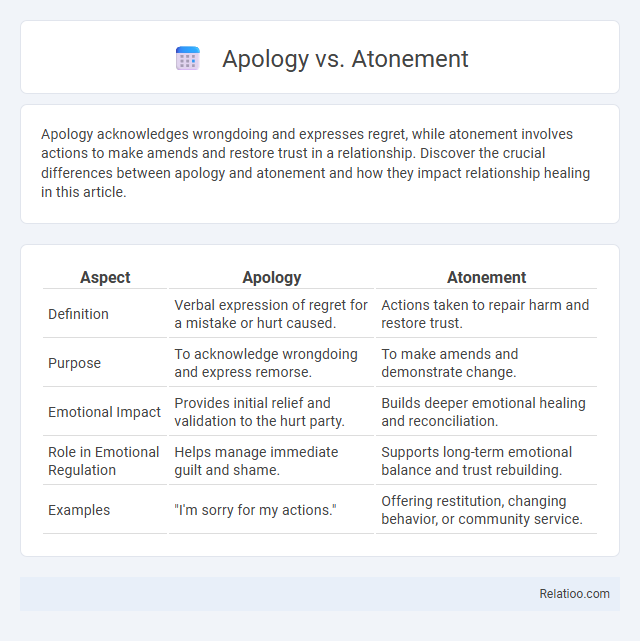Apology acknowledges wrongdoing and expresses regret, while atonement involves actions to make amends and restore trust in a relationship. Discover the crucial differences between apology and atonement and how they impact relationship healing in this article.
Table of Comparison
| Aspect | Apology | Atonement |
|---|---|---|
| Definition | Verbal expression of regret for a mistake or hurt caused. | Actions taken to repair harm and restore trust. |
| Purpose | To acknowledge wrongdoing and express remorse. | To make amends and demonstrate change. |
| Emotional Impact | Provides initial relief and validation to the hurt party. | Builds deeper emotional healing and reconciliation. |
| Role in Emotional Regulation | Helps manage immediate guilt and shame. | Supports long-term emotional balance and trust rebuilding. |
| Examples | "I'm sorry for my actions." | Offering restitution, changing behavior, or community service. |
Understanding Apology: Definition and Purpose
An apology is a verbal expression acknowledging a mistake or wrongdoing, intended to convey regret and foster emotional understanding between parties. Its primary purpose is to validate the feelings of the person wronged, laying the foundation for rebuilding trust and open communication. You enhance relational repair by offering sincere apologies that recognize harm and demonstrate accountability.
Defining Atonement: Beyond Saying Sorry
Atonement extends beyond a simple apology by involving actions that restore trust and address harm on a deeper level, emphasizing accountability and meaningful change. Unlike an apology, which is primarily verbal, atonement requires tangible efforts to make amends and foster reconciliation. Relational repair relies on these ongoing commitments to rebuild connection and strengthen emotional bonds between parties.
Key Differences Between Apology and Atonement
Apology involves acknowledging wrongdoing and expressing regret, primarily focusing on verbal recognition and emotional validation. Atonement requires actions that demonstrate remorse through reparative efforts, aiming to restore moral balance and accountability beyond mere words. Relational repair encompasses both apology and atonement, integrating communication and restorative actions to rebuild trust and strengthen interpersonal bonds.
Psychological Impact of Apology vs Atonement
Apology primarily addresses acknowledging wrongdoing and expressing regret, which can reduce immediate feelings of guilt and promote forgiveness in the offended party. Atonement involves actions taken to make amends, fostering deeper psychological healing by restoring trust and demonstrating commitment to change. Both processes contribute to relational repair, but atonement often results in longer-lasting reconciliation by reinforcing accountability and emotional restoration.
Cultural Perspectives on Seeking Forgiveness
Cultural perspectives significantly influence how apology, atonement, and relational repair are pursued and understood across societies. Some cultures emphasize verbal apologies as a critical step in acknowledging wrongdoing, while others prioritize tangible actions or rituals that demonstrate sincere atonement and rebuild trust. Understanding these cultural nuances can enhance Your ability to navigate forgiveness processes effectively in diverse social contexts.
The Role of Responsibility in Apology and Atonement
Apology primarily involves the acknowledgment of responsibility for a harm or wrongdoing, serving as a verbal expression of regret aimed at initiating the healing process. Atonement goes beyond apology by incorporating actions taken to make amends and restore balance, reflecting a deeper acceptance of responsibility through tangible reparations. Both apology and atonement play critical roles in relational repair by addressing accountability, fostering trust, and facilitating emotional reconciliation between parties.
Steps to Move from Apology to Atonement
Taking the necessary steps to move from apology to atonement involves acknowledging the harm caused, expressing sincere remorse, and taking concrete actions to make amends. You should listen to the affected party's feelings, demonstrate genuine understanding, and consistently show changed behavior to rebuild trust. Relational repair depends on ongoing commitment, transparency, and validating the other's experience to foster healing and restore connection.
Apology in Personal Relationships
An apology in personal relationships serves as a crucial first step in acknowledging wrongdoing and expressing regret, which can pave the way for deeper healing and trust restoration. Unlike atonement, which involves making amends through actions, an effective apology directly addresses the emotional impact on the other person and validates their feelings. Your sincere apology can significantly enhance relational repair by fostering open communication, reducing resentment, and promoting mutual understanding.
Atonement in Religious and Ethical Contexts
Atonement in religious and ethical contexts involves acts of making amends to restore harmony between individuals and the divine or moral order, often through rituals, confession, or ethical behavior. Unlike a simple apology, atonement requires a deeper commitment to rectifying wrongdoing and demonstrating genuine remorse through tangible actions. This process is essential for relational repair, fostering trust and reconciliation by addressing the spiritual and moral dimensions of harm.
Building Trust Through Genuine Reparation
Building trust through genuine reparation involves more than just an apology; it requires sincere atonement that acknowledges harm and demonstrates a commitment to change. Apology serves as the initial verbal acknowledgment of wrongdoing, while atonement entails concrete actions that repair relational damage, fostering healing and reconciliation. Effective relational repair integrates transparent communication, accountability, and consistent efforts to restore emotional safety and trust between parties.

Infographic: Apology vs Atonement
 relatioo.com
relatioo.com